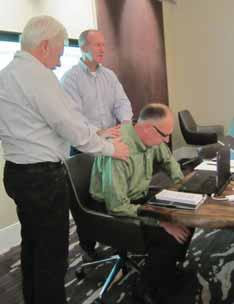









Ispent seven weeks this fall dealing with things that didn’t belong. It started with gallstones—they don’t belong and so surgery was recommended. Then it was bile leaking from my liver due to a rare complication from the surgery. A second surgery left me with two abdominal drains to extract the bile that was caustic to my body and didn’t belong. While the drains served an important purpose, the human body really doesn’t like having foreign objects inserted into it, and the drain sites became more sore and painful with each passing week until the drains were finally removed.
The experience of living with something that doesn’t belong, that corrodes or infects life, is helping to deepen my understanding of peace, a common theme this time of year. We understand from the prophet Isaiah’s description of God’s kingdom that peace will be one of its hallmarks: “Of the increase of his government and peace there will be no end. He will reign on David’s throne and over his kingdom, establishing and upholding it with justice and righteousness from that time on and forever. The zeal of the Lord Almighty will accomplish this” (Isa. 9:7).
In God’s kingdom, peace belongs; broken relationships do not. We work to alleviate suffering, strife and injustice because they don’t belong.
In God’s world, peace belongs; violence does not. In God’s kingdom, peace belongs; broken relationships do not. We work to alleviate suffering, strife and injustice because they don’t belong.
But just as getting rid of things that don’t belong in our physical bodies can take time and be painful and uncomfortable, our efforts to be peacemakers in families, churches and communities can be time consuming, bring their own aches and may even leave scars. How do you calmly navigate the holidays with your children following a divorce when everything your former spouse does drives you crazy? How do you serve joyfully on a church committee when the chair consistently ignores your suggestions? How do you talk publicly and at home about your child’s coach when your son or daughter is unfairly relegated to the bench? Not easy situations and no easy answers.
When faced with the challenges of living out my commitment to be an everyday peacemaker, I am inspired by the psalmist’s instruction to pursue peace (Ps. 34:14). Living at peace in my home, church and community requires me to be proactive and to be responsible for my actions. Chasing after peace begins with me—not a family member, not the people I go to church with and not the folks in my community. And so I resolve to practice the words of a popular Christmas song, “Let there be peace on earth (and in my family and my church and my neighborhood) and let it begin with me.”

Connie Faber Editor
















David Buller

Iam not sure I have ever thought of God giving a kiss. God is a warrior, a holy king, a judge. The Great Sovereign, majestic, full of power and glory, above all, before all and the Creator of all. But God kisses.
We do not read about Jesus doing this, save one instance in which its common practice is implied in Luke 7:45. Jesus not only receives kisses, he gives them out. God’s kiss is one dramatic act of a relational God bent on reaching us.
The 13 verses of Psalm 85 describe the hot kiss of God. The word “hot” has positive connotations—passion, emotion and desire. Hot also carries with it the meanings of anger, wrath and displeasure. To know just how fiercely God opposes sin requires a sensitive spirit, and the psalmist writes from just such a position. He is experiencing the relational consequences of a deep breech in protocol between friends. He remembers with fondness the good ole days (Ps. 85:1-3). He recalls that God forgives the iniquity of his people and covers their sins. He sets aside his wrath and turns from his fierce anger.
“God, please do that again,” is the heart-felt request (Ps. 85:4-7) that God would again overlook our wrong doings and restore his good doings to us, his people. Each of us, like prodigal sons and daughters, has ventured into the realms of darkness, felt the despair and has started back home to hopefully gain a standing as a servant. While we are still a long way off, the Father runs to embrace us, and it happens again. The hot kiss of God. Hot because of the emotion tied up in everything we have done and hot because of everything that he does.
What is unique in the God of the Christian Bible is that he kisses. He has already kissed, and he will do it again. Our oneyear-old daughter has learned to give goodnight kisses (she is quite good)—a practice that Jesus almost certainly learned as a young child. From the highest viewpoint, Advent and Christmas are the culmination of the ultimate relational coming together of God and human beings and the kiss of God. The promises of God and the hope of Psalm 85 (vv. 8-13) find their fulfillment in the actions of the Christ child, and once again God forgives and covers sins and sets aside his wrath and turns from his fierce anger. This is a Christmas gift to write home about.
May you feel the hot kiss of God. May the loving arms of your Heavenly Father embrace you as his child. May his kindness and salvation come to your home this Christmas season. And from our house to yours, Merry Christmas!
David Buller is the pastor of Cornerstone Community Church, a USMB congregation in Topeka, Kan.

“Love and faithfulness meet together; righteousness and peace kiss each other.” Psalm 85:10
December 2013 / January 2014 Volume 76 • Number 6
Connie Faber EDITOR
Myra Holmes ASSISTANT EDITOR
Shelley Plett GRAPHIC DESIGNER
Mullins Studio COVER PHOTO
LeRoy Goossen, Jr.
See story on page 20
The Christian Leader (ISSN 0009-5149) is a gathering place for the people, passions and mission of U.S Mennonite Brethren. The Christian Leader is published bimonthly by the U.S. Conference of Mennonite Brethren Churches. However, the opinions expressed here are not necessarily those of the church as a whole.
COPYRIGHT The articles printed in the Christian Leader are owned by the CL or by the author and may not be reprinted without permission. Unless noted, Scripture quotations are from the New International Version.
READER PARTICIPATION Letters to the editor should be 300 words or less and on one subject. Letters must be signed and include the writer’s city and state. Letters will be edited for clarity, appropriateness and length. Letters will be published, as space allows, unless marked, “Not for publication.” Readers interested in contributing essays for In My Humble Opinion and First Person should contact the editor. Freelance article submissions are welcome; a SASE must accompany articles.
SUBSCRIPTIONS $10 for six issues and $20 for 12 issues ($15, $30 in Canada; all other countries $25 for six issues); $1.50 per copy
CORRESPONDENCE: All correspondence, including subscription questions and address updates, should be addressed to Christian Leader Box 155, 107 N. Main, Hillsboro, KS 67063-0155 Phone: 620.947.5543
E-mail: christianleader@usmb.org
MEMBERSHIP The Christian Leader is a member of the Evangelical Press Association and Meetinghouse, an association of Mennonite and Brethren in Christ editors.
POSTMASTER Send address changes to Christian Leader, Box 155, Hillsboro, KS 67063. Periodicals postage paid at Hillsboro, Kansas.
The Christian Leader is published by

U.S. Conference of MB Churches

Ed Boschman USMB executive director ebed@usmb.org
Barna Group’s 2011 research “You Lost Me” indicates that six of 10 church kids walk away from their faith and/or the institutional church in the first decade of their adult life. Those of us who have served in local churches may wonder whether this early adult hiatus from church has been normative for decades, but research indicates the trend is growing. In the same study, Millennials say that what helps their faith grow are things like prayer, family, friends, the Bible, having children and their relationship with Jesus. Church does not make it into the top 10 factors.
What can we do to make church meaningful, helpful, fulfilling and relevant for these young men and women? David Kinnaman, president of Barna Group, suggests a handful of ways in which local churches can connect with and meaningfully serve Millennials. I’m highlighting four.
1. Ensure meaningful relationships. The study asserts, “The most positive church experiences among Millennials are relational.... Seven out of 10 Millennials who dropped out of church did not have a close friendship with an adult and nearly nine out of 10 never had a mentor at the church.” This is a clarion call to ensure that adults generally and youth pastors, leaders and sponsors specifically are befriending our emerging generation in meaningful relationships. This is not the same as driving kids around or planning an event for them.
2. Teach cultural discernment. The church can help Millennials engage their hearts and minds to understand cultural realities and to respond to them Christianly. The research indicates that “active Millennial Christians are more than twice as likely to say they ‘learned about how Christians can positively contribute to society’ compared to those who drop out (46 percent versus 20 percent).” Additionally, “Actives are also nearly four times more likely to say they ‘better understand my purpose in life through church’ (45 percent versus 12 percent).” This is great and encouraging
news. We can make an impact when we teach and think together through contextual real life subjects.
3. Prioritize reverse mentoring. This new phrase describes a reality in which older, experienced leaders invite Millennials to share leadership in the present. Barna’s Kinnaman describes it like this: “One way to think about this generation is that they are exiles in something like a ‘digital Babylon’—an immersive, interactive, image-rich environment in which many older believers feel foreign and lost. The truth is, the church needs the next generation’s help to navigate these digital terrains.” When we welcome these gifted and passionate young believers to contribute their savvy in the current environment and to be on mission as part of today’s church by serving the needy in their own communities and going on short-term mission trips, they understand and value their partnership and are much more inclined to stay connected.
4. Facilitate a vital relationship with Jesus and the Bible. Kinnaman reports, “Millennials who remain active are more likely than those who dropped out to say they believe Jesus speaks to them personally in a way that is real and relevant (68 percent versus 25 percent). Additionally, actives are much more likely to believe the Bible contains wisdom for living a meaningful life (65 percent versus 17 percent).” The opportunity here is broad and inviting. It is the privilege of the church to connect the living Spirit of Jesus Christ and the living Word of God to every aspect of life. Relevance matters. Experiential relevance is powerful both in the moment and for a lifetime.
So when Jesus and the Word are directly connected to meaningful relationships, cultural discernment and partnership in mission, Millennials are much more likely to experience the church as relevant and helpful. On this matter we can do more than hope and pray. We can take action on the above. Perhaps then, the church will make that coveted top 10 list once again.
It is the privilege of the church to connect the living Spirit of Jesus Christ and the living Word of God to every aspect of life.
When I was 33 weeks pregnant with Sam I was put on bed rest for five weeks. The nurse told me that
I’d regret any work I’d done if I had a tiny baby that I had to leave at the hospital for several weeks. My due date was April 16, so when we were driving to the hospital late at night in pre-term labor February 26, I vehemently resolved to take all medical advice I received because I was determined to have a full term, April baby.
My husband, Josh, was able to take the first week off work at the beginning of my bed rest. Josh’s mom and my mom were able to jump in and help out at a moment’s notice. For those first few days, our little family basically learned how to function without Mom being upright.
Violet, then almost 2 years old, loved it. Suddenly, Mommy was available to snuggle and read books anytime. Three-and-a-half year old Evy loved it. We played a lot of Candy Land and watched a lot of princess movies. But the house didn’t love it. And the dishes, laundry, housework, yard work and even the dog began to rebel against my new immobile lifestyle.
The doctor said, “Get as much help as you can.” And that’s when the term “church family” took on a whole new meaning to us. For the entire month of bed rest, I never spent a day alone with the kids. Every single day someone from our church family or biological family was at our house to help out.
Friends and family members shopped for groceries, diapers and kids’ allergy medicines. Helpers dressed my kids for me, changed diapers and let the dog in and out. Other moms from church brought their kids over to play with my girls while they did my dishes, set up Sam’s nursery, switched out loads of laundry, planted flowers in my yard or just sat with me on the couch to chat.
Some moms with older kids came over and got down on the floor and played with my kids in between sweeping, vacuuming and an everlasting stack of dishes. I lost count of how many saints loaded and unloaded my dishwasher while I explained from the couch where things belonged. One friend got to church early so that when the girls arrived with Josh, she could dress them, do their hair and take them to Sunday school while I was home resting.
And the meals! Friends and family brought over delicious foods and an almost constant supply of brownies— my favorite. Even moms that were pregnant themselves brought meals to us. One friend was so thoughtful she even brought paper plates and cups so Josh wouldn’t have to do the dishes.
Others helped spiritually. Prayer warriors prayed diligently for my health and Sam’s health. Prayers were not only sent up from Bethany MB Church here in Fresno, Calif., but also from saints all over the country at all hours. One warrior woke her husband in the middle of the night and they prayed for Sam and me.
People felt so sorry for me: “Poor Crystal, on bed rest for a month with those little girls to take care of.” But it was actually one of the most special months of my life. The blessings were overwhelming—being surrounded by friends and family that loved us so much and wanted to see us have a healthy baby with no complications. I treasured the faceto-face conversations that I had with friends who came over to bless me with their help, support and prayers. I treasured the savory meals and delectable desserts. I treasured having my “feet washed,” in Pastor Roger Poppen’s sense of the phrase. I was humbled to be served by so many brothers and sisters in Christ through their agape love for our family.
When Jesus speaks to this at the end of Matthew 25—“I was hungry and you gave me food…I was sick and you visited me”—I think I could add, “I was on bed rest and you came to clean my house. I was on bed rest and you brought your kids to play with mine. I was on bed rest and you prayed for my baby.” This is church family. This is love.
Samuel Joshua was born a few days after my bed rest ended, April 5, 2013. He was a whopping 8 pounds and 12 ounces, 22 inches long and completely healthy; certainly not a preterm, tiny baby. I blame the prayers, the help and the love...and the brownies.
Crystal Nachtigall, Fresno, Calif., originally shared this testimony on the Bethany MB Church blog, “proverbs2v6” (http://proverbs2v6.wordpress.com) and it is reprinted here with her permission.


When the USMB Leadership Board met Oct. 24-26 in Wichita, Kan., they affirmed the preliminary recommendation for a revised Article 13 of the USMB Confession of Faith as proposed by the national Board of Faith and Life (BFL), and they made decisions regarding leadership transition following the July 2014 retirement of Executive Director Ed Boschman. Article 13 of the USMB Confession of Faith describes biblical peacemaking in a violent world. The final revision of Article 13 will be presented to the USMB constituency at the biennial convention in July 2014 as a joint recommendation from BFL and the LB.
The LB also decided to defer the appointment of a new executive director following Boschman’s retirement. In an email following the meetings, LB chair Steve Schroeder says, “An appointed partnership and structure review team will be consulting with MB Foundation and our district ministers to help the board reevaluate which leadership ministries and services we will provide in order to better serve our pastors, districts and churches in the coming years. A temporary Interim Leadership Team will be appointed by July 1 to provide continuity for our USMB ministries.” The board also heard reports and updates from USMB staff, learned about the International Community of Mennonite Brethren and discussed the 2014 budget. LB and staff members continue to work toward a balanced 2014 budget that does not compromise ministry.—Myra Holmes
The North Carolina District Conference (NCDC) welcomed the first new church into the district in over 70 years when they gathered for their convention Sept. 13-15 at The Life Center, Lenoir, NC. Iglesia de Dios Bethel, Lenoir, NC, became the seventh NCDC church—the first time that the NCDC has added a church since 1942. Bethel is a mostly Hispanic congregation led by Pastor Fernando Huezo. Further marking the atmosphere of growth, a new pastor, Ray Dykes, who serves as pastor of Darby MB Church, Ferguson, NC, was ordained. “This year’s theme of ‘Growing in Faith’ really described the atmosphere of the weekend,” says Chris Eidse, pastor of Boone (NC) MB Church. Read more at www.usmb.org/ncdistrict-welcomes-new-congregation. —NCDC
Ed Boschman, standing left, and Steve Schroeder, standing right, pray for David Wiebe, seated, executive director of the International Community of Mennonite Brethren.

The USMB Board of Faith and Life (BFL) has published its preliminary recommendation for a revision to Article 13 of the USMB Confession of Faith. The new statement upholds the historic peace church position and aims for unity. The recommendation, “Love, Peacemaking and Reconciliation,” can be read online at www.usmb.org/bfl-open-letter-october-2013. The board’s third open letter to the USMB constituency and a document comparing the current version of Article 13 with the recommended version are also posted. BFL will finalize a formal recommendation at their March 2014 meeting and will prepare a recommendation for action at Conection 2014, the USMB biennial convention to be held July 25-26 in Santa Clara, Calif. —Connie Faber

USMB pastors who attend the National Pastors Conference July 2425 in Santa Clara, Calif., can expect encouragement, resourcing and networking. Keynote speaker Ed Stetzer will teach from extensive experience as a church planter, pastor, author and missiologist. He has written 15 books on church and mission—most recently Subversive Kingdom: Living as Agents of Gospel Transformation. Stetzer will speak for three sessions, plus one session at the general convention, Conection 2014, to be held July 2526. A new feature of the 2014 pastors’ event will be “affinity groups,” which will offer an opportunity for those in similar ministries to share questions, concerns and ideas. Additional workshops will resource church staff. Registration will open in January. Registration will be $110 per person for the Pastors Conference and $225 per person for Conection 2014. Watch www.usmb.org for details.

1. Lose weight
2. Get organized
3. Spend less, save more
• 45% Americans usually make New Year’s resolutions
• 39% People in their 20s achieve their resolution
• 14% People over 50 achieve their resolution
• 46% Resolutions maintained past 6 months

5 minutes with...
Winnie Bartel of Shafter (Calif.)
MB Church is secretary on the Executive Board of the National Association of Evangelicals (NAE). She represents USMB at NAE. Her involvement with NAE and related ministries has taken her to Washington, DC, and around the world advocating for women on issues of abuse and economic opportunity.

What has been a highlight of your involvement with NAE?

In 1995 the Ins tute on Religion and Democracy sent an eightmember team to the United Na ons Conference on Women in Beijing, China. NAE appointed me chaplain to that team. This experience opened my eyes to the great need of boldly speaking out for my faith—but always showing great compassion and love.
How have you been part of NAE’s efforts to influence policy in the U.S.?
God has called me and used my own history of abuse to give me a voice for abused women. I chaired an Internaonal Task Force on abuse against women and was called on three different mes to tes fy about women’s issues on Capitol Hill.
What are some national issues NAE is pursuing today?
Washington has come to respect NAE as the voice of evangelicals. We recently met in Washington, DC, with a group that included John McCain and former Homeland Security Secretary Janet Napolitano about immigra on reform. Gender issues are another current priority.
How is our small Mennonite Brethren denomination viewed in the larger evangelical world?
Mennonite Brethren are respected everywhere I go. We’re recognized as people of the Bible. Billy Graham himself once told me, “The MBs have a rich heritage that very few of us have. I hope you appreciate it.”

You stay involved in your local congregation as well. Why is that important to you?
The bo om line of NAE is the local church. My own involvement keeps me grounded and makes my tes mony real.
Graduate and traditional undergraduate enrollment set records this fall at Fresno Pacific University (FPU), the Mennonite Brethren school headquartered in Fresno, Calif. Total enrollment is 3,461, up one from fall 2012. There are 1,254 traditional undergraduates, up from last year’s record 1,227; 1,071 graduate students, up 5 percent; and 1,136 in bachelor’s degree completion, down from 1,212. Included in the graduate enrollment total is Fresno Pacific Biblical Seminary, the Mennonite Brethren school for theological education, which saw a 9 percent increase over fall 2012 to a total of 157. —FPU


Enrollment numbers for freshmen and new students are at an historic high this year at Tabor College, the Mennonite Brethren school headquartered in Hillsboro, Kan., with 246 new students, of which 159 are freshmen, 59 transfers and 28 high school and guest students. Total enrollment at the college’s two campuses stands at 736 students. The Hillsboro campus recorded 600 students taking classes, including high school students enrolled for dual credit. The Tabor College Wichita campus recorded 136 students enrolled, including graduate and undergraduate students. —TC
The Historical Commission of the U.S. and Canadian Mennonite Brethren Churches has released a new Profiles of Mennonite Faith bulletin insert biography and has announced that it will again offer two funded initiatives for 2014. The newest biography, written by Conrad Stoesz, highlights Mennonite conscientious objectors (COs) during World War 2. Two Historical Commission grant initiatives were introduced in 2013 and will be offered again in 2014: an open research grant of $1,500 in support of research and publication relating to the history and contribution of Mennonite Brethren women and a summer archival internship. More information available at www.mbhistory.org. —Historical Commission
MB Foundation, the USMB stewardship agency, recently taught biblical stewardship principles through a number of venues. MBF worked with the Southern District Conference to host a district pastors’ gathering Aug. 1-2 in Colorado Springs, Colo., on the theme, “Pastors, Spouses, Churches and Money.” MBF gathered Slavic leaders and pastors Aug. 27 in Portland, Ore., and Aug. 29 in Seattle, Wash., for discussions around “Church and Money.” A total of 14 churches participated in the two events. At the request of the Latin American MB District (LAMB), MBF provided teaching and facilitated discussion around the theme of “Raising Funds, Using Funds and Teaching on Stewardship” Sept. 28 in McAllen, Texas. All LAMB church boards were invited to attend the four-hour session. —MBF



Aman finally put up the lighted “N-O-E-L” sign in his yard one cold night close to Christmas. His first mistake was waiting so long and the second was putting the letters up from behind them instead of facing them. He fumbled and bumbled and said some very un-Christmas-like things in the process.
He finally finished, plugged in the lights and went to bed. The next morning he awoke to a foot of snow on the ground. He went outside to take a look at his sign and noticed that from the street it spelled, “L-E-O-N.” Now, his neighbor across the street was named Leon. And when the neighbor saw him fixing the sign he said, “Man, I thought that was just for me!”
The Advent theme of “light” is one that makes the coming of Christ personal. It allows each of us to say, “Man, I thought that was just for me.” When Jesus said, “I am the light of the world,” he was announcing one more time that he is God, come to make sense out of confusion as he turns darkness into light.
Light throughout the Bible
Have you ever noticed that the Bible begins and ends with light? Genesis 1 and Revelation 21 are very much about light. Clearly the theme of light is very close to the heart of the Bible’s message. In 1 John 1:5 we read, “God is light; in him there is no darkness at all.” Do a survey of the Bible and it seems that light and darkness find their way into all the major acts of God in biblical history:
• Creation begins when God, looking into the emptiness and darkness, says, “Let there be light!”
• God’s deliverance of Israel includes a plague of darkness over the land of Egypt and then leading the people through the desert for 40 years with a pillar of fire (light) by night.
• At Jesus’ birth angels appear to shepherds “and the glory of the Lord shone around them.” When wisemen from the East come seeking him, they follow the light of a star that shines brighter than any other light.
• When Jesus gives his life on the cross, darkness covers the land for three hours. Then the light dawns that resurrec-


tion morning to reveal an empty tomb, a living Savior.
• And we read in Revelation 21 that the holy city (heaven) “does not need the sun or the moon to shine on it, for the glory of God gives it light, and the Lamb is its lamp.”
For this Advent season and through Christmas Day let this one idea capture your mind—that God is light!
• “The Lord is my light and my salvation” (Ps. 27:1).
• “The Lord will be your everlasting light” (Isa. 60:19).
• “By his light I walked through darkness” (Mic. 7:8).
Has darkness come over you lately? Has a cloud blocked the Son of God from shining his light into your life? Receive the love of God as your light today. God is light in such a way that Jesus could say, “I am the light of the world. Whoever follows me will never walk in darkness, but will have the light of life” (John 8:12). This is a great Christmas message!
“I am the light of the world”
Here’s the setting in which Jesus spoke the words of John 8:12, “I am the light of the world.” If we look ahead to John 10 there is the Feast of Dedication, which we know as Hanukkah. This festival also includes a focus on light.
As we look back at John 7 we notice that Jesus is teaching in the temple during the Feast of Tabernacles (John 7:2). In John 7:14 we learn that Jesus makes an appearance about half way through this week-long festival, and in John 7:37 we


read that “on the last and greatest day of the Feast, Jesus stood and said in a loud voice, ‘If anyone is thirsty, let him come to me and drink.’” It just happens that on this day there is a water ceremony with a procession of people carrying water jars around the town and pouring them out. Jesus times his speech perfectly.
All that to say that John 8:12 is closely connected to this Feast of Tabernacles. During this festival the priests fill large, hanging, golden bowls with oil so that they become large lamps. These bowls of oil are lit when darkness falls over the city, and from history we learn that the blaze from these glowing lamps lights up every courtyard in Jerusalem.
Imagine the scene as the light from these bowls reflects off the yellow limestone walls throughout the city. It must have been spectacular. And now picture Jesus standing beneath these lit bowls of oil announcing, “I am the light of the world!”
No more darkness
As I picture this scene in my mind I realize that Jesus timed his speech in a way that his message meant something like this: You have seen the great blaze of light shining into the darkness of the night. This light illuminates our city every year at this festival. Tomorrow the feast will be over and all will be dark again. But you don’t have to live in darkness the rest of the year. The one who follows me will find light, not just for one night, not for just one festival, but will have the light of life!
And Jesus offers that light to us today. Will Jesus look at the lights on our trees and in our homes and our churches and say something like that? We light up our churches with special programs and decorations, but they don’t last. After Christmas Day, when all the lights come down, what will happen to you? Will you look for the next vacation, the next festival, the next program to try to outdo the last one? On January 1 will you be in darkness or will you have the light of life?
One year in the children’s Christmas drama there was a point at which the lights were to all go out except for one hidden light in the manger. It was supposed to shine out in the darkness to show the radiance of the newborn Savior. But something went wrong. The person controlling the lights became confused and everything went dark, including the manger. It was a tense moment in the crowd and on stage until one of the shepherds said in a loud stage whisper, “Hey, you switched off Jesus.”
Jesus didn’t come as the light of the world to be turned off and on. His announcement came with this
by DENNIS FAST

wonderful promise that whoever follows him will never walk in darkness, but will have the light of life.
The light in you
The good news of the Light of the World can be described like this:
No more faking—the light of the world God sees everything. You cannot hide from the light so you might as well just come totally clean before the Lord God. No need for pretense, no cover-up, no acting like you’re perfect. “Where can I go from your Spirit? Where can I flee from your presence?” (Ps. 139:7) God sees it all—open your heart to him.
No more fearing—the light of the world God knows everything. He knows the tragedies of our nation this year, he knew the innocent babies that died in Bethlehem at the hand of Herod and he knows about your pain and your fear. “The Lord is my light and my salvation, whom shall I fear?” (Ps. 27:1) God knows it all and offers to enter our lives.
No more failing—the light of the world God forgives every sin. The greatest gift ever given was when God, in Christ, came as the Savior of the world to become the payment for our sins. We fail, yes. We sin, of course. But we are no longer failures. “If we confess our sins, he is faithful and just and will forgive us our sins and purify us from all unrighteousness” (1 John 1:9). God forgives as we confess our sin. He saves and forgives.
We learn from the Christmas story in Luke that facing the light of the world can be a terrifying experience—at first. But then we realize that the light has come to dispel our fears: “And there were shepherds living out in the fields nearby, keeping watch over their flocks at night. An angel of the Lord appeared to them, and the glory of the Lord shone around them, and they were terrified. But the angel said to them, ‘Do not be afraid. I bring you good news of great joy that will be for all the people’”
(Luke 2:8-10.)
An old hymn is also an appropriate Advent hymn as it contains the words:
The whole world was lost in the darkness of sin;
The light of the world is Jesus.
Like sunshine at noonday his glory shone in;
The light of the world is Jesus.
Come to the light—tis shining for thee.
Sweetly the light has dawned upon me.
Once I was blind, but now I can see.
The light of the world is Jesus.
Dennis Fast is lead pastor at Reedley (Calif.) MB Church.


What I don’t want for Christmas
Ihave a Christmas list—what I call my Christmas non-gift list. These are the things I don’t want for Christmas.
1. I don’t want less commercialization at Christmas. I have come to see buying and selling as a normal condition of our society. Like death and taxes, it will always be with us. The infant Jesus was born into a very commercial world. His adult ministry was performed in the midst of rank commercialism.
He watched the temple be abused by the money changers. He ejected a legion of devils from the man of the Gadarenes and sent them into a herd of swine. He was much aware that the village people were more concerned about their financial loss than the healing of the man. Jesus did not run away from commercialism or merely decry it.
I don’t want less commercialism, but I do want to know when its power is controlling my soul. I want the courage to resist the pressure to make endless card lists, gift lists, food lists, clothes lists and activity lists more important than people and their needs. The latter was Jesus’ concern.
2. I don’t want the mystery of God demystified. I don’t want the mystery of God incarnate reduced to a simple mathematical equation so that I can feed the data into a giant computer to find out why God loves sinful humanity, how God works in an individual’s life to bring awareness of forgiveness or even why a person hungers to know God better.
I do not deny the longing that overcomes a person to reach out into the darkness to feel that God has skin or to hear an audible voice—to prove he is real by my senses. Yet to have the revelation of God completely analyzed and reduced to concrete terms would bring the meeting of God and humanity to the level of an encounter with the grocery checkout person.
Within each of us is a constant pressure to analyze and systematize what we cannot fully understand. Some preachers can’t resist hammering the great truths of the Scripture into three-point alliterative sermons or simple propositions, although I admit that sometimes they help.
The great sweep of God’s relationship to humanity from Genesis to Revelation is sliced into dispensations. The experience of Christ’s Spirit indwelling the believers becomes a complicated diagram with circles and thrones and dots and arrows. Christ’s return shows up as a complicated chart with lines and curves.
All these may have their place at some time, yet to be able to systematize, organize and put into order gives me a sense of power and control, whether it is a Christmas shopping list or God’s revelation to humanity. To systematize means to control.
This Christmas I want to stand in awe and wonder with the shepherds and wise men at the glory of God coming to earth in the form of a baby. I want to experience with Isaiah “the Lord high and lifted up,” very high up, higher than I can understand.
To demystify God is to do away with faith and worship and to turn humanity into totally mechanical beings.
3. I don’t want things seen to become the evidence of things not seen. In Hebrews 11 the apostle Paul writes that our faith life is to be the evidence of the supernatural world—the things we cannot see with the physical eye. By faith we are to believe in Christ as Savior of the world. By faith we are to believe in his power to work through us.
I do not want jeweled crosses or lapel pins, badges and buttons, mottos and posters, bumper stickers and banners, resolutions and church constitutions to become the evidence of the Christ-life.
Instead, this Christmas I pray that a cup of cold water for a thirsty person, visiting an hour with a lonely older person, the gift of a coat, peace where there is bloodshed and bombing may be more clearly the “evidence of things not seen.”
4. Finally, this Christmas, in my 89th year, I do not want an end to questioning. I realize that often a person’s faith is judged valid to the extent that he or she accepts all ecclesiastical pronouncements without embarrassing questions. Too often a probing person makes others uncomfortable and is labeled “unspiritual” and out of order.
I believe we need more questioning about the church’s responsibility regarding racism, ageism, sexism, violence and rank injustice of all kinds, not just about issues related to human sexuality. We need disturbing questions that rouse us out of our lethargy and a readiness to follow the Spirit’s leading in the answers.
Here ends my non-list. Blessed Christmas to all.
Former Christian Leader columnist Katie Funk Wiebe, of Wichita, Kan., is the author of a dozen books and numerous articles and in her late 80s, is still on a limited speaking circuit. This essay is from her blog, Second Thoughts (http://kfwiebe.blogspot.com), which is about life as an octogenarian and is reprinted with permission.





by KATIE FUNK WIEBE

King Herod’s evil actions prompt us to ask: What’s wrong with us?

by PIERRE GILBERT


Christmas still and surprisingly evokes more than just pure entertainment. There is a strange but noticeable kind of sentimentality that unexpectedly emerges for a few weeks. Hollywood sings the praises of the “Christmas spirit.” Ebenezer Scrooge erupts on our TV screens, and once again that old miserable, tight-fisted creature is transformed by the spirits of Christmas into a generous, turkey-giving, benevolent elderly gentleman.
But great projects always involve formidable obstacles. From the very beginning, something goes terribly wrong with the human race. You can read all about it in Genesis 3.
The fall, as we now call it, is catastrophic. It affects the cosmos, human nature and the entire course of human history. The aftermath is so devastating that God should walk away.
It’s clear to me that we maintain a sweet and sour relationship with Christmas. While we see it as a time to party and spend big— the survival of our economy, no less, being at stake—the Christmas season compels us to reflect on the less fortunate. Until New Year’s Eve, that is, at which time we are free to let go of our therapeutic guilt and wallow in the welcome revelry of the New Year celebrations.
You have to admit there is something extraordinary about Christmas. The birth of Christ still has an energy that the enormous weight of a 21st century secular humanism is unable to crush.
Christmas is about…
To understand the significance of Christmas, we need to ask a most basic question: What is it really all about? A cursory look around us will reveal that Christmas is about glitter, crowded malls, nauseatingly sentimental TV specials, time off, sumptuous meals, the traditional heartburns and let’s not forget the presents.
Of course there is a baby in there somewhere. Everybody loves babies. What is not to like about them? They are cute, cuddly and have an uncanny ability to attract politicians. Is that it? Is that what Christmas is really all about?
Those of us who are a little more theologically sophisticated believe that Christmas is primarily about God taking on human form. It’s about God becoming one of us. But why would God do this? What could possibly motivate the infinitely powerful Creator of the universe to put himself through this kind of trouble? The answer is both simple and profound: God has a project.
From eternity past, God intends to create a people made up of men and women who will be free and who will choose to love and serve him for all eternity. For thousands of years, God is painstakingly working at this project—calling, prodding, redeeming one man and one woman at a time. This project predates the creation of the world, spans all of human history and is even now rushing into eternity.
But infinite love and commitment never give up. After the fall, God immediately sets his eternal plan of redemption into motion. The first stages of this initiative unfold throughout the history of Israel. When the stage is set, the last piece of the puzzle is then put into place: “Today in the town of David a Savior has been born to you; he is Christ the Lord” (Luke 2:11).
Why does Christ have to die for the sins of humanity? What does he save us from? This may seem like a trite question, but throughout history, powerful forces have sought to trivialize the answer. And our generation is no exception. The Gospel of Matthew offers a profound insight into this question.
In the story known as the Massacre of the Innocents (Matt. 2:13-23), the evangelist opens a window on the terrible alien-ness that infects human nature. Herod the Great hears that magi from the East are looking for a newborn king. This is bad news for everybody, for Herod perceives this as a personal threat to his rule. The announcement that a new king is born represents an issue for most kings, but this is particularly true for this Herod.
It is tempting to describe Herod as a mentally ill man who comes from a family where mental illness runs wildly through the genes, but that is not fair to those who truly suffer from mental disorders. While the members of the Herodian dynasty can fairly be described as disturbed individuals, I don’t think mental illness does justice to what’s really going on with King Herod.
It is far more accurate to describe Herod the Great as a man who has, like so many before and after him, given in to the siren call of the evil that inhabits us all (Matt. 15:18-19). He has fed his evil impulses until they become a raging fire, an irrepressible corruption that consumes him from the inside out, rising to within a fraction of an inch from the surface of his skin, leaving the moral pus to gush out at the slightest touch.
The darkness of the soul has grown long and thick tentacles around the king’s heart.

